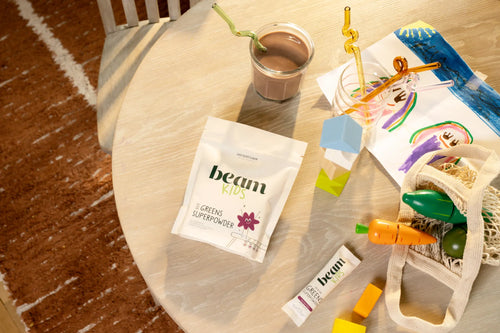Vitamins for Gut Health That Support Digestion
Your gut does more than break down food. It’s the control center for your digestive health, energy, mood, and immune system. When your gut is balanced, you feel it—steady energy, fewer bloating episodes, and a calmer belly. When it’s off, you may notice fatigue, digestive issues, or even changes in your skin and mood.
One way to support a healthy gut is through the right vitamins. These essential nutrients help strengthen the gut lining, fuel beneficial bacteria, and maintain a smooth functioning digestive system.
Why Gut Health Depends on Nutrition
Think of your gut as a garden. The gut microbiome is the soil, the gut lining is the fence, and vitamins are the water and sunlight that keep everything thriving.
- Vitamins support good bacteria, allowing them to multiply and crowd out harmful bacteria.
- They protect and repair the gut lining, keeping the digestive tract strong.
- They regulate inflammation and boost the immune system.
Without sufficient nutrients, the balance is disrupted. You may experience bloating, constipation, diarrhea, stomach upset, and fatigue.
The Best Vitamins for Gut Health
Not every vitamin impacts the gut the same way. Some protect the gut lining, others fuel beneficial bacteria, and some calm inflammation throughout the digestive tract. Together, they help create the conditions for a healthy digestive system. Here are the key vitamins and minerals to focus on for overall gut health.
Vitamin A: The Gut Lining’s Bodyguard
Vitamin A isn’t just for vision—it’s essential for gastrointestinal health. This fat-soluble nutrient helps keep the gut lining strong, acting as the first barrier against harmful bacteria while allowing essential nutrients to pass through. A healthy gut lining also reduces the risk of digestive issues, such as leaky gut.
Food sources: brightly colored vegetables such as carrots, sweet potatoes, and spinach, plus eggs and liver. Pair Vitamin A with healthy fats like avocado or olive oil to boost absorption.
B Vitamins: The Gut’s Energy Crew
The B-vitamin complex is a cornerstone of digestive health. These vitamins convert food into energy, support enzyme production, and keep the digestive system running efficiently. Riboflavin (B2) fuels good bacteria in the gut, while folate (B9) and B12 repair intestinal cells and support red blood cell formation.
Food sources: whole grains, legumes, leafy greens, eggs, and poultry. For those who struggle to get enough, a B-complex supplement can help fill dietary gaps.
Vitamin C: The Healer and Antioxidant
Vitamin C plays a big role in maintaining overall gut health. It reduces inflammation in the digestive tract, supports collagen production to strengthen the intestinal walls, and helps the immune system defend against harmful bacteria. It also improves iron absorption from plant-based foods, making meals more nutrient-dense.
Food sources: citrus fruits, bell peppers, broccoli, and strawberries. Including Vitamin C-rich foods daily supports both digestion and immunity.
Vitamin D: The Microbiome Booster
Vitamin D is one of the most crucial vitamins for maintaining gut health and supporting immune function. Low levels are linked to irritable bowel syndrome, inflammatory bowel disease, and reduced gut microbiome diversity. A well-balanced gut microbiome plays a crucial role in digestion, nutrient absorption, and maintaining long-term gastrointestinal health.
Food sources: fatty fish, egg yolks, and fortified dairy products. Since many people don’t get enough sun exposure, Vitamin D3 supplements are often recommended as part of gut health supplements.
Vitamin E: The Anti-Inflammatory Ally
Vitamin E protects cells in the digestive tract from oxidative stress and helps reduce irritation. For individuals experiencing chronic bloating or stomach discomfort, this antioxidant can help support smoother digestion and provide comfort.
Food sources: nuts, seeds, olive oil, and avocado. Natural Vitamin E (d-alpha tocopherol) is better absorbed than synthetic forms.
Vitamin K: The Absorption Helper
Vitamin K may not get much attention, but it’s vital for a healthy gut. Produced partly by gut bacteria, it aids calcium absorption, supports blood clotting, and helps your body get the most from the food you eat.
Food sources: leafy greens like kale and spinach, along with fermented foods such as natto and sauerkraut, which provide Vitamin K2—a form closely tied to digestive health.
Zinc + Magnesium: The Mineral Sidekicks
Zinc and magnesium aren’t vitamins, but they’re essential for digestive health. Zinc helps repair the gut lining and supports enzyme production, while magnesium regulates muscle contractions that maintain bowel regularity. Magnesium citrate is useful for constipation, while magnesium glycinate is gentler on sensitive stomachs.
Food sources: oysters, nuts, pumpkin seeds, and leafy greens provide a solid boost of these minerals.
How Vitamins Shape the Gut Microbiome
The gut microbiome—your community of beneficial microbes—depends on vitamins to thrive.
- B vitamins fuel microbial growth.
- Vitamin D supports microbial diversity.
- Vitamins A and C strengthen intestinal walls.
- Zinc and magnesium aid smooth digestion.
When balanced, your gut bacteria produce short-chain fatty acids that reduce inflammation, strengthen the immune system, and promote overall gut health.
Signs You May Be Missing Key Vitamins
Your digestive system often signals when something’s off. Watch for:
- Persistent bloating or constipation.
- Fatigue or low energy (possible B12 or iron issue).
- Digestive problems like diarrhea or stomach upset.
- Frequent infections or a weakened immune system.
If symptoms continue, consult a healthcare provider. They can test for deficiencies and recommend the right gut health supplements.
Fermented Foods and Live Cultures
Fermented foods like yogurt, kefir, kimchi, sauerkraut, and kombucha provide vitamins and probiotics. These foods contain active cultures of live bacteria that support overall gut health and improve microbial balance.
Other Nutrients and Dietary Supplements That Support Digestion
Beyond vitamins, other nutrients play a role in gastrointestinal health:
- Fiber: feeds good bacteria and supports bowel regularity.
- Omega-3 fatty acids: reduce inflammation in the digestive tract.
- Peppermint oil: may ease bloating, gas, and abdominal pain.
For daily gut health, Beam Greens Superpowder is a trusted option for both adults and kids, providing nutrients that support digestion and strengthen the immune system. Adding this kind of gut health supplement to your routine can boost the benefits of vitamins and make your overall wellness plan more effective.
Choosing Gut Health Supplements
When selecting gut health supplements or probiotic supplements, look for:
- Third-party testing for purity and safety.
- Bioavailable forms of vitamins (like methylated B vitamins or D3).
- Clear probiotic strains and CFU counts.
- Labels are free from fillers or artificial ingredients.
Some blends combine vitamins, prebiotics, and probiotic supplements into one product. Beam Biotic, for example, is a tribiotic powder with prebiotics, probiotics, postbiotics, and gut-friendly nutrients—all designed to support a healthy digestive system.
Nourish Your Gut, Nourish Your Life
Supporting your gut health with the right vitamins and supplements can significantly improve your digestive comfort and overall well-being. From vitamin D supporting your gut lining to probiotics maintaining bacterial balance, each nutrient plays a vital role in keeping your digestive system running smoothly.
Remember that supplements work best as part of a balanced approach that includes a nutritious diet, adequate hydration, and healthy lifestyle habits. Start with one or two key supplements based on your specific needs, and give your body time to respond before adding more.
Taking care of your gut health is an investment in your overall health. With the right combination of vitamins for gut health from trusted brands like Beam, you can support your digestive system and enjoy the benefits of a well-functioning gut.
Frequently Asked Questions (FAQs)
What's the best vitamin for your gut?
Vitamins such as D, C, and B-complex play essential roles in supporting gut health. They help regulate gut bacteria, protect the gut lining, and support digestion.
What are the symptoms of an unhealthy gut?
Symptoms include bloating, gas, diarrhea, constipation, skin issues, mood swings, and fatigue. These indicate an imbalance in gut bacteria, which can be addressed with a balanced diet and supplements.
Do vitamins really help with gut health?
Yes. Certain vitamins like Vitamin D, Vitamin C, and B vitamins directly support the gut lining, microbiome, and digestion.
Can you take probiotics and vitamins together?
Yes. Vitamins create an environment that allows beneficial bacteria to thrive, while probiotics are live microorganisms that help maintain gut balance.



